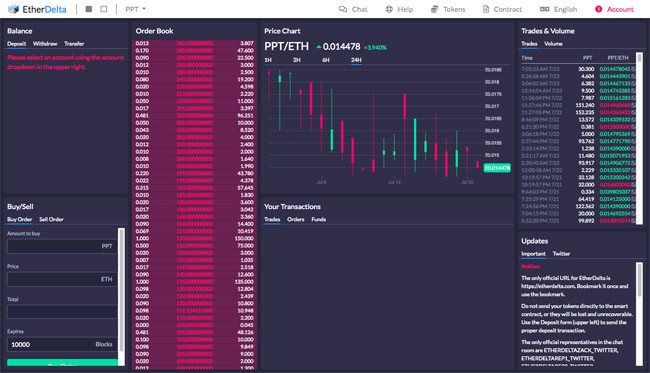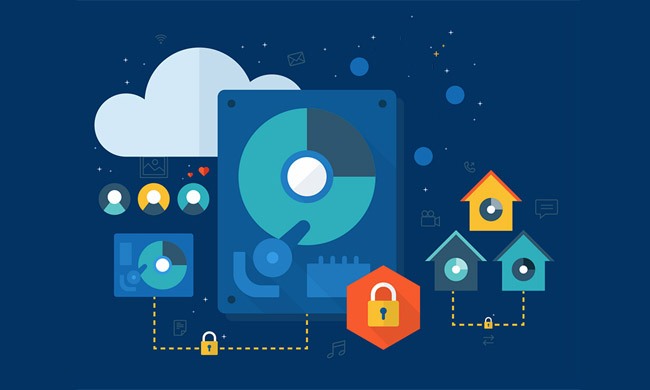EtherDelta quickly became the go-to exchange for trading ERC-20 tokens. Operating as a decentralized exchange specializing in ERC-20 tokens and Ethereum it quickly gained traction with users who appreciated the privacy offered by the marketplace, and the ability to trade any ERC-20 token, even those that had just been released.
EtherDelta Review: Overview
The EtherDelta decentralized exchange was launched in 2017 by its founder Zack Coburn, and very quickly the decentralized exchange became the favorite of traders in Ethereum and any ERC-20 tokens. The exchange was ground breaking at the time, using smart contracts to manage funds and trading, all through integration with a users wallet, and without the need to register.
The early success of the exchange was partially due to the fact that it became the first place to access most ERC-20 tokens when they were released. In most cases a token would not get listed immediately on a major exchange, so EtherDelta was perfect for those looking to buy or sell newly released coins.
When it was at its peak, EtherDelta saw roughly $10 million in daily trading volumes. However, as new decentralized exchanges emerged, and a management change at EtherDelta rattled traders, the trading volumes have seen a steady decline and as of July 2018 EtherDelta rarely sees $500,000 in daily trading.
EtherDelta Review: Trading on EtherDelta

One of the most interesting and useful features of EtherDelta is its use of smart contracts. Because of this users do not need to open an account in the traditional sense. All that’s required to unlock the full functionality of deposits, trading and withdrawals is to create an Ethereum account (private/public key pair) on EtherDelta and then link an external wallet to the created Ethereum address.
The user interface at EtherDelta differs somewhat from the more mainstream centralized exchanges, and it does take some getting used to. You’ll find everything you need to complete a trade right on the front page though, and this includes price charts, an order book and your wallet. In fact, you can complete a trade without navigating off the home page at all.
To get started you’ll need to use the “Select Account” link in the upper right corner of the home page. This will let you link an existing Ethereum address, or create a new one with the exchange. It’s also possible to synch your Ledger Nano S or MetaMask account and trade from these wallets.
EtherDelta is a bit confusing at first, and to use the exchange you first need to transfer some coins from your personal wallet to the exchange wallet. You can do this from the Balance box on the left of the exchange screen by choosing “Deposit”. That will show any available funds in a linked wallet under “Wallet” and any funds in the exchange wallet under “EtherDelta”. To transfer funds simply enter the amount of ETH or other coin you want to transfer from your wallet to the exchange wallet and click the “Deposit” button.
Once you click “Deposit” you’ll get a pop-up that shows the Etherscan address for tracking the transaction. You just need to wait for the transaction to be verified and then the funds will be in your EtherDelta wallet and ready to be used for trades. Withdrawals are done in the same manner, except the “Withdrawals” button is clicked to move coins from the EtherDelta wallet to your external linked wallet.
Once coins are available in the exchange wallet you are able to trade any ERC-20 token, placing market and limit orders in the same way you would on one of the centralized exchanges. The transfer process may take some getting used to, but the use of smart contracts means you have more control over your assets when compared with the centralized exchanges. It also provides better security, since funds never need to be stored with the exchange.
EtherDelta Review: Fees
The fees charged by EtherDelta are fair and placing an order is free as it doesn’t require an Ethereum transaction. The only trading fee is a 0.3% fee paid when a person executes an order, and that is paid in the instrument being sold. For a complete list of fees you can see this chart that was posted by EtherDelta on Reddit.
Advantages of EtherDelta
The exchange has a few advantages over other exchanges as follows:
Decentralized – EtherDelta allows users more privacy and anonymity as a fully decentralized exchange. It also gives users more flexibility in how they choose to use the exchange, and in how they store their coins. Some users were very attracted to EtherDelta because there’s no need to create an account and give any personal information.
Wide range of tokens – Because the exchange lists every ERC-20 token that exists, and as soon as it is released, EtherDelta is excellent for those looking to trade Ethereum or ERC-20 tokens. In some cases EtherDelta is the only exchange where a token can be found.
Flexibility – Users are able to add new tokens to the site by just inputting the necessary details and tokens that have just been released from ICOs are often first listed on EtherDelta.
Disadvantages of EtherDelta
Complicated interface – While everything you need to trade is right on the home page of EtherDelta, it is not particularly user-friendly. This is especially true if you’re new to cryptocurrencies and trading. Many costly mistakes have been made in the past by users who either misread or mistyped orders.
Slow trades – Because every single trade goes through the EtherDelta smart contracts it depends on the Ethereum network to function. If the Ethereum network is backlogged the trading experience at EtherDelta can be very slow and frustrating. During the CryptoKitties fad trades could take hours or even days to get verified.
ETH only – Ethereum remains the base currency on the site and all the tokens on the exchange are paired against ETH. Also, only ERC-20 tokens are supported and currencies such as Bitcoin and Litecoin are unavailable.
EtherDelta Review: Security

Image credits:
The use of smart contracts and integration of personal wallets should make EtherDelta one of the most secure cryptocurrency exchanges in operation. In addition, users do not need to create accounts that are tied to personal information or hold any funds in an exchange wallet.
The smart contracts at EtherDelta work together with Ethereum wallet addresses and private keys, making it impossible for anyone to improperly access funds, since it’s not possible to access the funds in any address without also holding the private keys to that address. This makes EtherDelta more secure than any of the centralized exchanges currently in operation, which hold your funds and private keys, making them more susceptible to hackers.
Your wallet address on EtherDelta can be viewed by hackers , but since they aren’t able to access the private keys it does them no good. However, hackers have found a way around that recently, and in December 2017 the exchange suffered an unexpected and damaging hack.
In December 2017 an individual or group was able to hack the EtherDelta domain name, performing a phishing attack via the DNS server. This way they were able to swap the website with a compromised version designed to steal information. This allowed them to take control of 305 ETH, worth $244,000 at the time.
This hack was certainly damaging for EtherDelta, especially since the hacker was able to steal the private keys of anyone who used them on the copycat site. This meant that even after the real site was back online some users reported the theft of funds from their wallets.
While the exchange could probably get past this hack, there have been other issues. One of the most troubling has been the sale of EtherDelta by founder Zack Coburn to an unnamed person or group. Since the sale there have been a number of changes at EtherDelta that have been extremely unpopular with its user base. These include an ICO, and charging new projects to get their coins listed on EtherDelta. There have also been reports of changes to the fee structure, with some users being required to pay fees well in excess of those listed in the fee schedule posted on Reddit and linked to from the EtherDelta site. This new team has lost much of the confidence built up by EtherDelta and users are increasingly wary of using the site as reports of lost funds continue to trickle in.
If you didn’t reveal your private keys on the website when it was hacked it’s still safe to use EtherDelta. In fact, with the smart contracts you should be safer on EtherDelta than on centralized exchanges. That said, EtherDelta remains unfriendly to users, and especially so to new users. While the site is safe, it isn’t necessarily the best place for new traders.
In Conclusion
EtherDelta quickly became the hub of Ethereum and ERC-20 trading after being launched in 2017. Its decentralization was attractive, and the listing of newly ICOed ERC-20 tokens was especially appealing. Despite the difficult user interface and awkward trading process the exchange filled a need and became popular very quickly.
However, there are now alternatives available, and the recent hack and new management team have eroded much of the confidence that was previously built at EtherDelta. The new management team not only remains anonymous, but there is no telling what changes they might have in mind for the exchange.
Interestingly, this has all led to the emergence of the ForkDelta project, which is attempting to run a decentralized exchange based on the original practices and principles of EtherDelta. And of course there are a number of decentralized exchanges that have sprung up during the first half of 2018, such as IDEX and Ethfinex.
Because of the changes at EtherDelta it is probably best if new traders consider one of the better designed decentralized exchanges. Those who’ve been using EtherDelta over the years can certainly continue, but it might be good to trade from a new account, and not keep any more funds than necessary in the linked wallet for trading. EtherDelta used to be great, but it may have seen its time pass by already.